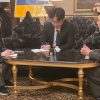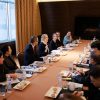The end of the year is always an occasion to evaluate accomplishments and miscalculations. The New Europe Center decided to look at the foreign policy of Ukraine in 2018 through cartoons. Illustrations by Andriy Yermolenko have long been known not only to Ukrainians, as this artist has actually become an art diplomat, defending the interests of Ukraine through creative means. This year, his posters on Russia’s aggression against the backdrop of the world football championship in Russia were especially noteworthy. Andriy Yermolenko responded to the New Europe Center’s initiative and prepared several posters about certain events and trends of the passing year in foreign policy. Those who would like to get the relevant analytics will find quotes from the materials prepared by the New Europe Center in 2018 (with links) next to the cartoons.
1. Granting autocephaly to the Ukrainian Orthodox Church
“The most important accomplishment of Ukraine on the diplomatic front this year is achieving the decision to establish the independent Ukrainian Church. Regardless of how important the role of both the Foreign Ministry and the Minister was in this process, this is an obvious victory of Ukrainian diplomacy”.
Comment by Alyona Getmanchuk, Director of the NEC, “2018 summary: accomplishments and failures of the MFA of Ukraine”
2. Russia’s aggression against Ukraine in the Kerch Strait on November 25, 2018
“The construction of the bridge over the Kerch strait by Russia created a new tool for Russia to control the Azov Sea and put in motion a de facto creeping annexation of the Azov Sea. The treaty governing the rights in the Azov Sea dates to 2003 and stipulates that the sea is basically considered as internal waters which gives the right to Ukraine and Russia to control all the suspected boats in the sea. However, Russia is de facto using the sea as its “own lake” and blocks the transportation, as there is no state border defined”.
Discussion paper “Assessing the Key Challenges of the Eastern Partnership 2020 Deliverables in the Area of Security”
“The most controversial issue, which obviously holds back the Ukrainian diplomats, is the possible impact of denunciation of the Ukraine-Russia Agreement on Cooperation in the Azov Sea and the Kerch Strait of 2003 on resolving the disputes between Ukraine and Russia in international judicial instances. It should be noted that not all lawyers in Ukraine support this position, considering that the existing agreement does not allow that. There is also a certain risk of a discrediting campaign that Moscow has actually already initiated against Ukraine”.
Memo “PRO et CONTRA: Should Ukraine Denounce the Azov Agreement?”
3. The dispute between Ukraine and Hungary around the adoption of the Education Law in 2017, followed by new conflicts and misunderstandings this year, especially due to the issuance of Hungarian passports in the Transcarpathian region
“In case of Hungary and Poland, it’s controversial issues in bilateral relations with Ukraine, such as minority language protections and the approach to historical memory. Russia gains a major advantage in playing these countries off against each other and preventing them from supporting Ukraine’s European and Euroatlantic aspirations”.
“The conflict with Hungary has already moved beyond a mere discussion over the education law. During a visit to Romania, Viktor Orban made a provocative statement to the effect that Ukraine will never join the EU or NATO and that Budapest was going to establish a post in the Hungarian Government for an Ombudsman for the development of Zakarpattia. There was also a recent scandal with the Hungarian consul issuing Hungarian passports in Berehovo—although this was not the first time this had taken place in Zakarpattia. Obviously, Budapest is settling into a long-term conflict. With Orban’s unpredictability and the approach of elections to the European Parliament, it’s hard to see how this will end—and that affects the unblocking of the Ukraine-NATO Commission’s work”.
ТRUMAN Index № 4(8) Ukraine-NATO Relations
4. Ukraine has decided not to prolong the Treaty on Friendship, Cooperation and Partnership with Russia
“The announcement that Ukraine would not extend the treaty gave rise to a storm of criticism in Russia. Officially, it came down to two key messages: one was that, from now on, Moscow would not be tied to any obligations; the second dismissed the current administration as short-sighted. Russia’s Foreign Ministry announced that relations would now have to be restored, “obviously with other, more responsible politicians in Ukraine.” This was nothing more than a transparent suggestion by Russian diplomats that the current leadership of a neighboring state needed to be replaced. And this has become the entire basis of Russia’s policies towards Ukraine: to ensure that politicians who are more loyal to Moscow come to power, are more amenable to agreements and will “fix the mistakes of their predecessors”.
ТRUMAN Index № 4(8) Ukraine-Russia Relations
5. Ukraine has received the aspiring country status from the NATO
“The complex and painful process of recognition of Ukraine’s aspiring country status once again demonstrates the attitudes within the NATO: it seems that Yanukovych’s decision of 2010 on the non-aligned status was received by the NATO members states much better than the last year’s law on Ukraine’s membership in the Alliance. Otherwise, it is difficult to explain why Brussels had been stubbornly unwilling to notice the law foreseeing the integration in the Alliance adopted in Ukraine last summer and finally correct the wording of Kyiv’s intentions regarding the NATO almost until the end of February”.
Blog by Alyona Getmanchuk, Director of the NEC, “NATO aspirant is not a real membership applicant”
“Ukraine joined the list of aspirants only after President Poroshenko apparently sent a letter to SecGen Stoltenberg thoroughly explaining Ukraine’s Euroatlantic aspirations after they met at the Munich Security Conference in February 2018. News that the site had been changed was received with such excitement in Ukraine that the Alliance got nervous: if Ukraine were granted EOP status, it could interpret this with a big dollop of wishful thinking about membership. Even before the summit, NATO officials emphasized that such status was in no measure a step towards membership. And so they decided not to give Ukraine reason to speculate. NATO officials are careful to avoid talk of membership and never tire of repeating that Ukraine has to focus on reforms and not on symbolic statuses and formulations”.
ТRUMAN Index № 4(8) Ukraine-NATO Relations
6. United States supplying Javelin anti-tank missile systems to Ukraine
“Sources in diplomatic circles say that President Trump started his meeting with President Poroshenko in Brussels with a question along the lines of “Have you tried our Javelins yet?” In fact, as is known, Ukraine can only use them on parade if the situation on the front doe not change and Russia does not attack openly. The Javelins were not given to Ukraine to be used as desired, but came with many strings attached. This means that, either Trump was ill informed about the terms on which the Javelins were provided to Ukraine. Or maybe he was simply hinting that it was time to add some purchases to what Kyiv had received for free”.
ТRUMAN Index № 4(8) Ukraine-US Relations
Overall, in 2018, the New Europe Center have prepared 25 analytical materials. Please find their complete list below:
- Policy memo “G7 in Ukraine: Support, Criticism, or Critical Support?”
- Research “Eastern Partnership Index 2015-2016”
- Memo “How Should Ukraine Approach Germany under New-Old Coalition?”
- Discussion paper “Foreign Policy Audit: Ukraine-Latvia”
- Research “Westernization Index 2018”
- Policy brief “The Traps of the Transnistrian Settlement: how do we avoid them?”
- Analytical article “German Crisis Management Efforts in the Ukraine–Russia Conflict from Kyiv’s Perspective”
- Policy brief “Silence of Kharkiv”
- Opinion poll “New Europe: what do Ukrainians think?”
- TRUMAN Index №3 (7): “Ukraine-US Relations”
- TRUMAN Index №3 (7): “Ukraine-EU Relations”
- TRUMAN Index №3 (7): “Ukraine-Russia Relations”
- Policy brief “The Three Seas Initiative: Ukraine’s Opportunity for Practical European Integration”
- Policy memo “PRO et CONTRA: Should Ukraine Denounce the Azov Agreement?”
- Opinion poll “What Kind of Assistance do Ukrainians Expect from the EU and the US?”
- Discussion paper “Talking Business: How to Keep Southern Ukraine Engaged in European Integration?”
- TRUMAN Index №4 (8): “Ukraine-US Relations”
- TRUMAN Index №4 (8): “Ukraine-EU Relations”
- TRUMAN Index №4 (8): “Ukraine-Russia Relations”
- TRUMAN Index №4 (8): “Ukraine-NATO Relations”
- Commentary “Ukraine-US: Restarting Strategic Partnership. Or Strategic Patronage?”
- Commentary “ Trump, show us that you aren’t Mr. Obama”
- Policy commentary “Who Will Be the First? Which Countries Would Dare to Violate the Unity of the European Union Against the Sanctions Imposed on Russia?”
- Research “Atrophy of Trophies. How Can Ukraine Take Advantage of the Vulnerabilities of Russian Policies in the EU?”
- Discussion paper “Assessing the Key Challenges of the Eastern Partnership 2020 Deliverables in the Area of Security”
The posters was published within the Think Tank Development Initiative for Ukraine (TTDI), carried out by the International Renaissance Foundation in partnership with the Think Tank Fund of the Open Society Initiative for Europe (OSIFE) with financial support of the Embassy of Sweden in Ukraine. The views and opinions expressed in this paper are those of the author and do not necessarily reflect the position of the Embassy of Sweden in Ukraine, the International Renaissance Foundation, and the Open Society Initiative for Europe (OSIFE).













